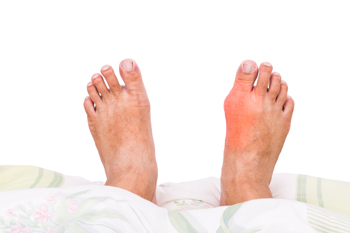
Bunions manifest primarily as the big toe angling towards the other toes, causing a bony protrusion on the inner edge of the foot. Symptoms include pain, swelling, callused skin, and foot shape changes. Treatment aims to alleviate discomfort and may involve painkillers, orthotics, or surgery for severe cases. Untreated bunions can worsen and lead to complications like arthritis or toe misalignment. Bunions are more prevalent in women, possibly due to footwear choices like high heels. Other causes of bunions include genetics, arthritis, and ill-fitting shoes. Prevention involves wearing properly fitting shoes with ample toe room, and avoiding tight or high-heeled footwear. Surgery is often the only solution for severe cases but may not guarantee complete recovery. If you have a bunion that causes you pain, it is suggested that you make appointments with a podiatrist for regular monitoring and treatment.
If you are suffering from bunion pain, contact Dr. Dean D. Hinners of Illinois. Our doctor can provide the care you need to keep you pain-free and on your feet.
What Is a Bunion?
Bunions are painful bony bumps that usually develop on the inside of the foot at the joint of the big toe. As the deformity increases over time, it may become painful to walk and wear shoes. Women are more likely to exacerbate existing bunions since they often wear tight, narrow shoes that shift their toes together. Bunion pain can be relieved by wearing wider shoes with enough room for the toes.
Causes
- Genetics – some people inherit feet that are more prone to bunion development
- Inflammatory Conditions - rheumatoid arthritis and polio may cause bunion development
Symptoms
- Redness and inflammation
- Pain and tenderness
- Callus or corns on the bump
- Restricted motion in the big toe
In order to diagnose your bunion, your podiatrist may ask about your medical history, symptoms, and general health. Your doctor might also order an x-ray to take a closer look at your feet. Nonsurgical treatment options include orthotics, padding, icing, changes in footwear, and medication. If nonsurgical treatments don’t alleviate your bunion pain, surgery may be necessary.
If you have any questions, please feel free to contact one of our offices located in Metropolis and Eldorado, IL . We offer the newest diagnostic and treatment technologies for all your foot care needs.
